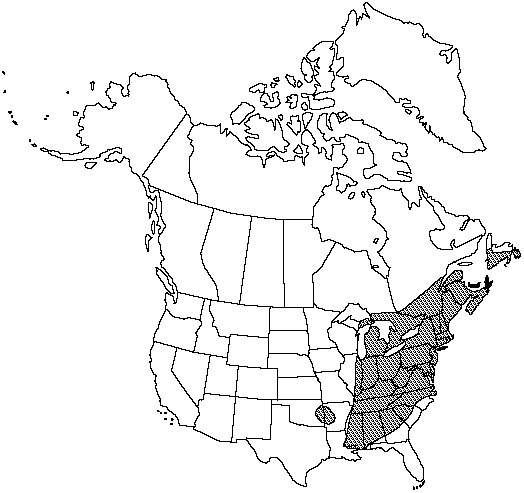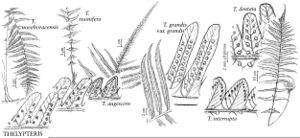Difference between revisions of "Thelypteris noveboracensis"
Amer. Midl. Naturalist 1: 225. 1910.
FNA>Volume Importer |
imported>Volume Importer |
||
| (5 intermediate revisions by 2 users not shown) | |||
| Line 8: | Line 8: | ||
}} | }} | ||
|common_names=New York fern;thélyptéride de new york;fougère de New York | |common_names=New York fern;thélyptéride de new york;fougère de New York | ||
| − | |basionyms={{Treatment/ID/ | + | |special_status={{Treatment/ID/Special_status |
| + | |code=F | ||
| + | |label=Illustrated | ||
| + | }}{{Treatment/ID/Special_status | ||
| + | |code=E | ||
| + | |label=Endemic | ||
| + | }} | ||
| + | |basionyms={{Treatment/ID/Basionym | ||
|name=Polypodium noveboracense | |name=Polypodium noveboracense | ||
|authority=Linnaeus | |authority=Linnaeus | ||
| + | |rank=species | ||
| + | |publication_title=Sp. Pl. | ||
| + | |publication_place=2: 1091. 1753 | ||
}} | }} | ||
|synonyms={{Treatment/ID/Synonym | |synonyms={{Treatment/ID/Synonym | ||
|name=Dryopteris noveboracensis | |name=Dryopteris noveboracensis | ||
|authority=(Linnaeus) A. Gray | |authority=(Linnaeus) A. Gray | ||
| + | |rank=species | ||
}} {{Treatment/ID/Synonym | }} {{Treatment/ID/Synonym | ||
|name=Parathelypteris noveboracensis | |name=Parathelypteris noveboracensis | ||
|authority=(Linnaeus) Ching | |authority=(Linnaeus) Ching | ||
| + | |rank=species | ||
}} {{Treatment/ID/Synonym | }} {{Treatment/ID/Synonym | ||
|name=Thelypteris thelypterioides | |name=Thelypteris thelypterioides | ||
|authority=(Michaux) Holub | |authority=(Michaux) Holub | ||
| + | |rank=species | ||
}} | }} | ||
|hierarchy=Thelypteridaceae;Thelypteris;Thelypteris subg. Parathelypteris;Thelypteris noveboracensis | |hierarchy=Thelypteridaceae;Thelypteris;Thelypteris subg. Parathelypteris;Thelypteris noveboracensis | ||
| Line 34: | Line 47: | ||
|habitat=Terrestrial in moist woods, especially near swamps, streams, and in vernal seeps of ravines, often in slightly disturbed secondary forests, frequently forming large colonies | |habitat=Terrestrial in moist woods, especially near swamps, streams, and in vernal seeps of ravines, often in slightly disturbed secondary forests, frequently forming large colonies | ||
|elevation=0–1100 m | |elevation=0–1100 m | ||
| − | |distribution=St. Pierre and Miquelon;N.B.;Nfld.;N.S.;Ont.;P.E.I.;Que.;Ala.;Ark.;Conn.;Del.;D.C.;Ga.;Ill.;Ind.;Ky.;La.;Maine;Md.;Mass.;Mich.;Miss.;N.H.;N.J.;N.Y.;N.C.;Ohio;Okla.;Pa.;R.I.;S.C.;Tenn.;Vt.;Va.;W.Va. | + | |distribution=St. Pierre and Miquelon;N.B.;Nfld. and Labr. (Nfld.);N.S.;Ont.;P.E.I.;Que.;Ala.;Ark.;Conn.;Del.;D.C.;Ga.;Ill.;Ind.;Ky.;La.;Maine;Md.;Mass.;Mich.;Miss.;N.H.;N.J.;N.Y.;N.C.;Ohio;Okla.;Pa.;R.I.;S.C.;Tenn.;Vt.;Va.;W.Va. |
|tables= | |tables= | ||
|references= | |references= | ||
| Line 43: | Line 56: | ||
-->{{#Taxon: | -->{{#Taxon: | ||
name=Thelypteris noveboracensis | name=Thelypteris noveboracensis | ||
| − | |||
|authority=(Linnaeus) Nieuwland | |authority=(Linnaeus) Nieuwland | ||
|rank=species | |rank=species | ||
| Line 52: | Line 64: | ||
|habitat=Terrestrial in moist woods, especially near swamps, streams, and in vernal seeps of ravines, often in slightly disturbed secondary forests, frequently forming large colonies | |habitat=Terrestrial in moist woods, especially near swamps, streams, and in vernal seeps of ravines, often in slightly disturbed secondary forests, frequently forming large colonies | ||
|elevation=0–1100 m | |elevation=0–1100 m | ||
| − | |distribution=St. Pierre and Miquelon;N.B.;Nfld.;N.S.;Ont.;P.E.I.;Que.;Ala.;Ark.;Conn.;Del.;D.C.;Ga.;Ill.;Ind.;Ky.;La.;Maine;Md.;Mass.;Mich.;Miss.;N.H.;N.J.;N.Y.;N.C.;Ohio;Okla.;Pa.;R.I.;S.C.;Tenn.;Vt.;Va.;W.Va. | + | |distribution=St. Pierre and Miquelon;N.B.;Nfld. and Labr. (Nfld.);N.S.;Ont.;P.E.I.;Que.;Ala.;Ark.;Conn.;Del.;D.C.;Ga.;Ill.;Ind.;Ky.;La.;Maine;Md.;Mass.;Mich.;Miss.;N.H.;N.J.;N.Y.;N.C.;Ohio;Okla.;Pa.;R.I.;S.C.;Tenn.;Vt.;Va.;W.Va. |
|reference=None | |reference=None | ||
|publication title=Amer. Midl. Naturalist | |publication title=Amer. Midl. Naturalist | ||
|publication year=1910 | |publication year=1910 | ||
| − | |special status= | + | |special status=Illustrated;Endemic |
| − | |source xml=https:// | + | |source xml=https://bitbucket.org/aafc-mbb/fna-data-curation/src/2e0870ddd59836b60bcf96646a41e87ea5a5943a/coarse_grained_fna_xml/V2/V2_207.xml |
|genus=Thelypteris | |genus=Thelypteris | ||
|subgenus=Thelypteris subg. Parathelypteris | |subgenus=Thelypteris subg. Parathelypteris | ||
Latest revision as of 20:22, 5 November 2020
Stems usually long-creeping, 1.5–2.5 mm diam. Leaves monomorphic, dying back in winter, mostly evenly spaced 1 cm or more (sun-gathering leaves in loose cluster), (25–)40–85 cm. Petiole straw-colored, 4–25 cm × 1–3 mm, at base with scales tan to reddish brown, ovate, glabrous. Blade elliptic, 15–60 cm, proximal 4–10 pinna pairs gradually smaller toward base (smallest often less than 5 mm), blade tapering gradually to pinnatifid apex. Pinnae deeply pinnatifid to within 1 mm of costa, 3–9(–13) × 1–2(–2.5) cm; segments oblong to linear, somewhat oblique, entire to crenulate; proximal pair of veins from adjacent segments meeting margin above sinus. Indument abaxially of moderately to densely set hairs to 1 mm on rachises, costae, and veins, glands lacking or yellowish to light orangish, mostly sessile on blade tissue; blades adaxially often with hairs on veins. Sori round, supramedial; indusia tan, often ciliate; sporangia glabrous. 2n = 54.
Habitat: Terrestrial in moist woods, especially near swamps, streams, and in vernal seeps of ravines, often in slightly disturbed secondary forests, frequently forming large colonies
Elevation: 0–1100 m
Distribution

St. Pierre and Miquelon, N.B., Nfld. and Labr. (Nfld.), N.S., Ont., P.E.I., Que., Ala., Ark., Conn., Del., D.C., Ga., Ill., Ind., Ky., La., Maine, Md., Mass., Mich., Miss., N.H., N.J., N.Y., N.C., Ohio, Okla., Pa., R.I., S.C., Tenn., Vt., Va., W.Va.
Discussion
Selected References
None.
